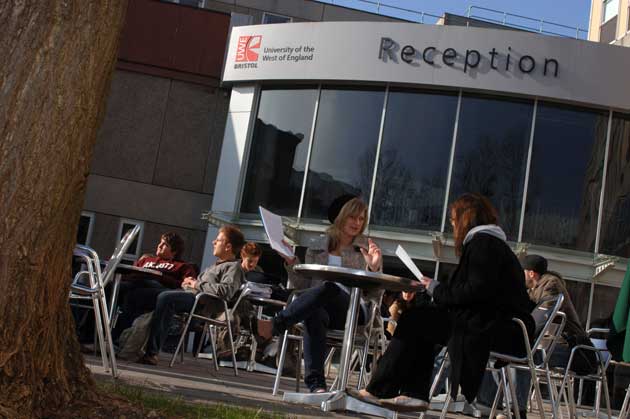Universities 'must double annual fees to £6,500'

Your support helps us to tell the story
From reproductive rights to climate change to Big Tech, The Independent is on the ground when the story is developing. Whether it's investigating the financials of Elon Musk's pro-Trump PAC or producing our latest documentary, 'The A Word', which shines a light on the American women fighting for reproductive rights, we know how important it is to parse out the facts from the messaging.
At such a critical moment in US history, we need reporters on the ground. Your donation allows us to keep sending journalists to speak to both sides of the story.
The Independent is trusted by Americans across the entire political spectrum. And unlike many other quality news outlets, we choose not to lock Americans out of our reporting and analysis with paywalls. We believe quality journalism should be available to everyone, paid for by those who can afford it.
Your support makes all the difference.University vice-chancellors want to more than double student fees to £6,500 a year to protect teaching standards. Sources said last night that a government review later this year is bound to lead to a rise in fees whoever wins the next election – against a backdrop of warnings that a university education will become unaffordable for poorer students. Some vice-chancellors want a substantially larger increase from the present level of £3,145 a year.
The influential report by Universities UK, the body which represents vice-chancellors, said in a report released today that £6,500 is the average fee necessary to protect undergraduate teaching standards.
The consultants who carried out the research said that all 20 of the elite Russell Group universities would introduce fees of £7,000 a year for every course if that became the permitted ceiling.
The report said fees of £7,000 a year would push up student debt from an average £17,500 upon graduation to £32,000. Even if fees were increased to £5,000 a year, debt would rise to between £22,000 and £26,000.
Student leaders were outraged last night. Wes Streeting, the president of the National Union of Students, said it was "extremely arrogant for university vice-chancellors to be fantasising about charging their students even higher fees and plunging them into over £32,000 of debt". He added: "Vice-chancellors are being extremely complacent about how extending the current system would allow market forces to run riot in our universities. Poorer students would be priced out of the more 'prestigious' institutions and this must be avoided at all costs."
The UCU, the university lecturers' union, said raising fees "would further damage plans to open up universities to the brightest students rather than just those who can afford tuition".
Ministers are cautious about raising fees before the general election but the report's claim that a rise to £5,000 would not put people off applying for places is likely to impress the Universities Secretary, John Denham.
A rise to £7,000 a year, it is argued, would put young people off, particularly those from debt-averse families in poorer circumstances. This would jeopardise moves to widen university participation among the disadvantaged.
Insiders say that whatever happens at the election, student fees will rise because only the Liberal Democrats are implacably opposed to tuition fees.
David Willetts, the Conservatives' spokesman on universities, welcomed the report: "We do need robust information on the options for funding higher education – especially as the recession takes hold of people's finances."
He accused the Government of delaying its review. "It is a shame the university sector has been forced to do the work themselves. We are keen to work with the Government on a bipartisan approach but we cannot wait forever."
The first signs of a Labour rebellion over increasing fees emerged last night with the publication of a Commons early day motion warning of the high level of student debts. Paul Farrelly, the Labour MP for Newcastle-under-Lyme, who voted against the higher "top-up fees" when they were introduced in 2006, said: "We need to increase participation by students from poorer backgrounds, not price them out of going to university at all."
Stephen Williams, for the Liberal Democrats, said: "It is no surprise that many of the vice-chancellors involved with this research would like to see tuition fees more than doubled. The conclusions would be very different if students' views were considered."
The report, based on interviews with vice-chancellors from various types of universities – Russell Group members, redbrick universities and former polytechnics – said the introduction of a £5,000 cap on fees "is effectively the maintenance of the status quo".
The report added that "at this level we believe students are price insensitive... and there is no change in the number of students enrolled in higher education".
If the fee cap was put at £7,000, the report forecast that universities would be more likely to charge different fees from one another, with all those in the Russell Group opting for the maximum and others charging less to encourage applicants. It said it would "make potential students change their behaviour and might discourage some from enrolling in higher education".
"At this higher fee, students from different socio-economic backgrounds will be affected differently, with lower income potential students being more sensitive to a change in price.
"The increase in the tuition fee therefore reduces student enrolment... [and makes] the university student population less representative of the wider population."
Professor Rick Trainor, the president of Universities UK, said: "By some means or other more money needs to be put into teaching and learning if we're to meet the rising expectations of both domestic and international students." He said that any fees increase was likely to be introduced in 2013.
32,000
Expected average student debt, in pounds, if fees are increased.
Join our commenting forum
Join thought-provoking conversations, follow other Independent readers and see their replies
Comments